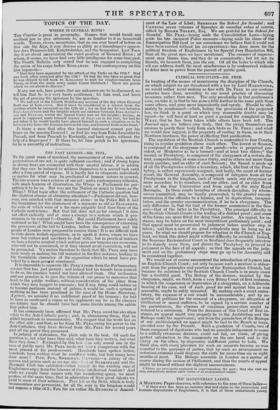CLERICAL DISCIPLINE—DR. FREE.
IN treating of the means of maintaining the discipline of the Church, on which subject we are threatened with a law by Lord HannwicEE, we would rather avoid making so free with Dr. FREE as our contem- poraries have done, according to our usual practice of discussing measures rather than men. The only peculiarity in that gentleman's case, we take it, is that he has gone a little further in the same path than some others, and gone more imprudently and openly. Should he ulti- mately be condemned—which, bating the provisions of the projected law, we think is a point on which very reasonable doubts may be raised—he will have at least as good a ground for complaint as Mr. Waay, that he has been taken while others have been left. The Journal says, we believe very truly, that the clergy themselves are anxious to purify their body from such blots as Dr. FREE ; and what we would now suggest, is the propriety of vesting in them, as in their Northern brethren, the power of effecting that purification. The regulation of the Scottish Church is committed to four Courts, rising in regular gradation above each other. The lowest or Session, is composed of the clergyman of the parish—who is perpetual pre- sident, or Moderator as he is termed—and at least two elders;* the second, or Presbytery., is composed of the clergymen of a certain dis- trict, comprehending in some cases thirty, and in others not more than seven parishes, and an elder of each Session ; the Synod is made up of all the Presbyteries within a boundary, which, like that of the Pres- byteiy, is rather capriciously assigned; and lastly, the court of dernier resort, the General Assembly, is composed of delegates from all the Presbyteries in the kingdom, each of which sends one clergyman or more according to its numbers, and one elder, and of an elder from each of the four Universities and from each of the sixty Royal Boroughs. In these courts breaches of church discipline, by whom- soever committed, may be legally prosecuted, to the greater excom- munication if the offender be a layman, and to deprivation, incapaci- tation, and the greater excommunication, if he be a clergyman. The only difference is, that the trial of the former commences in the Ses- sion—that of the latter in the Presbytery. The principal difficulty in the Scottish Church Courts is the leading of a distinct proof; and some of the forms are more fitted for delay than justice. An appeal, for in- stance, may be taken on the most insignificant preliminary point ; and that appeal must be prosecuted to judgment before another step is taken ; and thus a case of no great complexity may be hung up for years. In what we should propose for adoption in the Church of Eng- land, we think this defect might without difficulty be avoided. Indeed, the Supreme Ecclesiastical Court in Scotland does frequently interfere to its remedy even there, and directs the Presbytery to' proceed to judgment in the face of all appeals ; so that the appeals on the judg- ment and on the preliminary steps may go up to the Assembly and be considered together. We would not of course recommend the introduction of laymen into an English Church Court ; not only because such a mixture is abhor- rent from the principles and practice of the Episcopalian Church, but because its existence in the Scottish Church Courts is in many cases but a doubtful good. The Bishop of the diocese, assisted by the clergymen, might, we think, form a very fitting Court of first instance, to which the suspension or deprivation of a clergyman, on a deliberate hearing of his case, and of such proof for and against him as was accessible, might be safely intrusted. By making such a court ambu- latory, the expense of a suit would be inconsiderable ; and by re- quiring all petitions for the removal of a clergyman, on allegation of intellectual or moral unfitness, to be signed by a certain number of his parishioners, the chances of vexatious prosecution might be reduced to a minimum. From the decisions of this Court of first in- stance, an appeal might very properly lie to the Archbishop and the Bishops under his supervision; and from the jurisdiction of the Bishops of one archbishoprick an appeal might be had to the Bench at large, presided over by the Primate. Such a gradation of Courts, two of them composed of dignitaries who had no possible inducement to come to a wilfully erroneous decision, could not fail, we think, of giving perfect satisfaction to the community on the one hand and to the clergy on the other, by dispensing indifferent justice to both. We think also, with every provision for such an accurate hearing as was essential to the purposes of justice, that by such an arrangement no notorious criminal could disgrace the cloth for more than six or eight months at most. The Bishops assemble in London as a matter of course during the session of Parliament, and thus the courts of appeal might be formed without the slightest inconvenience.
* Elders are principally employed in superintending the poor ; they also visit the sick, and perform several other duties of an ecclesiastical nature.


















 Previous page
Previous page